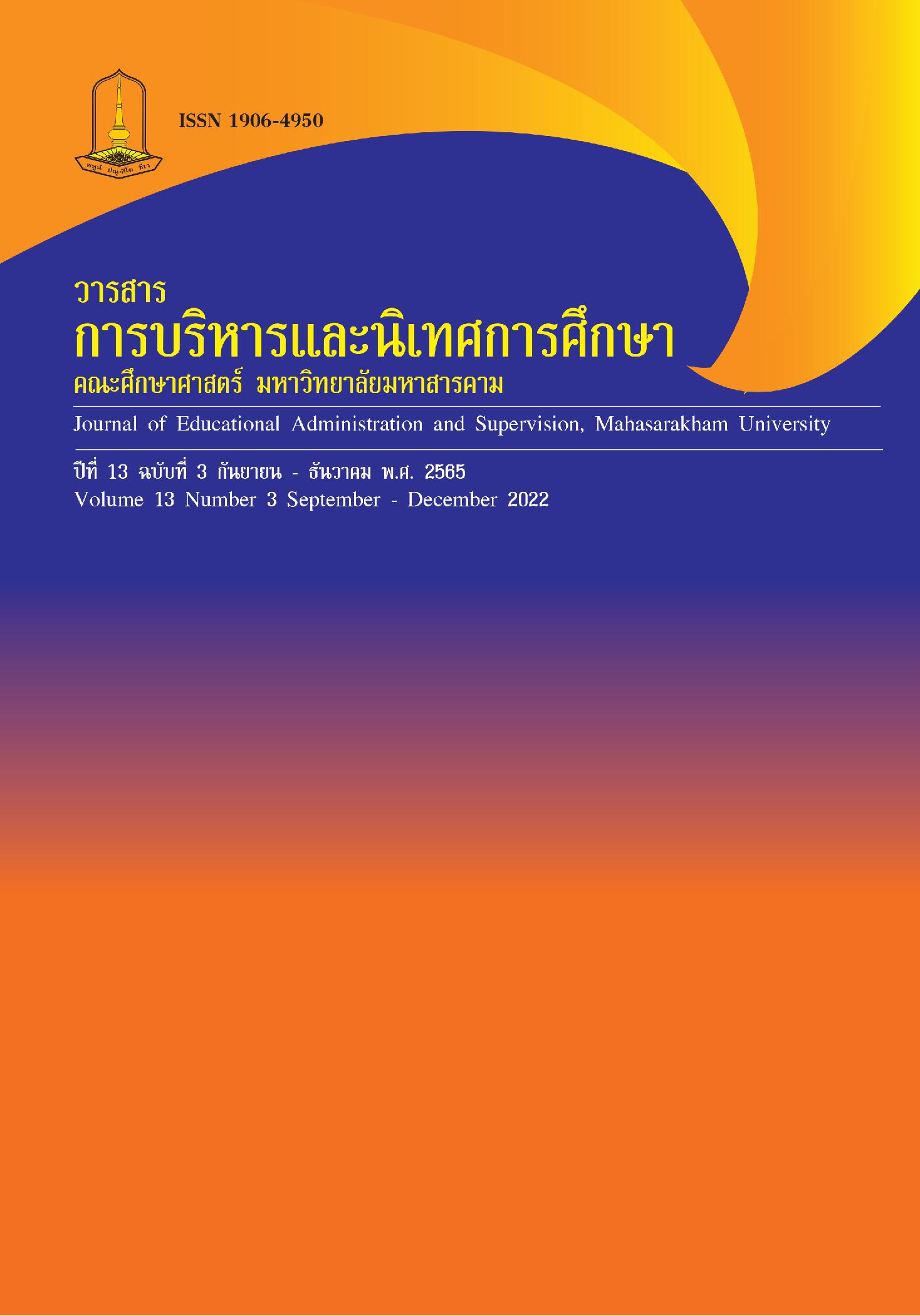Executive Functions
Main Article Content
Abstract
The article aims to present the knowledge of Executive Functions (EF) that is advanced cognitive process of prefrontal cortex associated with an individual's thinking, feeling, and acting. They are crucial fundamentals of developing cognition created from childhood through adulthood. That's why the individual with appropriate EF development of each own age can control emotion and needs effecting to his inhibition and also monitoring cognition, emotion, and behavior to meet the desired targets and then end with the success. EF comprises of 3 basic components including; working memory, inhibitory control, and cognitive flexibility that their functions on working processes are appropriately and continuously up to meet the targets. As view that, Ef is very important for the parents who should acknowledge in raising the children as well as the teachers who teach and train the students through various activities operating by themselves. For those activities are activated through working memory, inhibitory control, and cognitive flexibility that make the actors improve the brain in managing their events successfully; e.g. learning, working, and life living. Hence, the individual with EF can operate his thinking and managing successfully on many events appropriately that are desired needs of the family, society and nation.
Downloads
Article Details
References
กระทรวงศึกษาธิการ. (2561). คู่มือหลักสูตรการศึกษาปฐมวัย พุทธศักราช 2560 (สำหรับเด็กอายุ3-6 ปี). กรุงเทพฯ: สำนักงานคณะกรรมการส่งเสริมสวัสดิการและสวัสดิภาพครูและบุคลากรทางการศึกษา.
เกดิษฐ์ จันทร์ขจร. (2562). การบริหารจัดการของสมองขั้นสูง: แนวคิดและแนวทางประยุกต์เพื่อ พัฒนาการเรียนรู้ของผู้เรียน. วารสารวิชาการศึกษาศาสตร์ คณะศึกษาศาสตร์ มหาวิทยาลัยศรีนครินทรวิโรฒ, 20(2), 111-126.
จุฑามาศ แหนจอน. (2560). การพัฒนาหน้าที่บริหารจัดการของสมองสำหรับวัยรุ่นโดยหลักสูตรการเรียนรู้แบบบูรณาการ. วารสารศึกษาศาสตร์ มหาวิทยาลัยบูรพา, 28(2), 130-144.
ฐาปณีย์ แสงสว่าง, วิไลลักษณ์ ลังกา, ดารณี อุทัยรัตนกิจ และสุวพร เซ็มเฮง. (2559). การพัฒนาตัวบ่งชี้ทักษะการบริหารการรู้คิด อารมณ์ และพฤติกรรมสำหรับนักเรียนชั้นประถมศึกษา. วารสารBU ACADEMIC REVIEW, 15(1), 14-28.
ดุษฎี อุปการ และอรปรียา ญาณะชัย. (2561). การเสริมสร้างพัฒนาการการเรียนรู้ของเด็กปฐมวัยควรเลือกใช้หลักการใด: "การเรียนรู้โดยใช้สมองเป็นฐาน" หรือ "การคิดเชิงบริหาร".Veridian E-Journal, 11 (1), 1635-1651.
พัชรินทร์ พาหิรัญ. (2561). ผลของโปรแกรมสมอง จิตใจ และการเรียนรู้ ต่อหน้าที่บริหารจัดการของสมองในนักเรียนชั้นประถมศึกษา วิทยานิพนธ์ วศ.ม., มหาวิทยาลัยบูรพา, ชลบุรี.วิกิพีเดีย สารานุกรมเสรี. (ม.ป.ป.). Executive Functions. https:/th.wikipedia.org/wiki/Executivefunctions
วีระศักดิ์ ชลไชยะ. (2561). พัฒนา EF ตั้งแต่ปฐมวัย...รากฐานของการพัฒนาประเทศในยุค Thailand4.0. สื่อสารกุมารแพทย์, 39(1), 11-13.
สำนักงานกองทุนสนับสนุนการสร้างเสริมสุขภาพ. (2561). คู่มือพัฒนาทักษะสมอง EF Executive Functions ในเด็กวัย 13-18 ปี สำหรับพ่อแม่และครู, กรุงเทพฯ: ไอดีออล ดิจิตอล พริ้นท์จำกัด.
Ahrens, B., Lee, M., Zwibruck, C., Tumanan, J., & Larkin, T. (2019). The Role of ExecutiveFunction Skills for College Age Students. [Online]. Available from: https://ir.library.illinoisstate.edu/giscsd/19 [accessed 15 May 2020].
Anderson, V. (2001). Assessing executive functions in children: biological, psychological, and developmental considerations. Pediatric Rehabilitation, 4(3), 119-136.
Bindman, S. W., Hindman, A. H., Bowles, R. P., & Morrison, F. J. (2013). The Contributionsof Parental Management Language to Executive Function in Preschool Children.Early Childhood Research Quarterly, 28(3), 529-539.
Calwell, S., Wilson, F. C., McBrinn, J. Carton, S., Delargy, M., McCann, J. P. Walsh, J., &McGuire, B. E. (20 14). Self-awareness following acquired brain injury: measurement and relationship to executive functioning. Journal of Psychology, 53-68.
Center on the Developing Child at Harvard University. (2011). Building the Brain's "Air TrafficControl" System: how early experiences shape the development of executive function. [Online]. Available from: http://www.developingchild. harvard.edu.[accessed 25 April 2020].
Cooper-Kahn, J., & Dietze, L. (2009). Executive Functioning. [Online]. Available from:https://chadd.org/wpcontent/uploads/2018/06/ATTN_02_09_ExecutiveFuncti oning.pdf.[accessed 25 April 2020].
Cristofori, I., Cohen-Zimerman, S., & Grafman, J. (20 19). Executive functions. Handbook ofClinical Neurology, 163, 197-219.
Diamond, A. (2013). Executive Functions. The Annual Review of Psychology, 64, 135-68.
Gallant, S. N. (2016). Mindfulness meditation practice and executive functioning:Breaking down the benefit. Consciousness and Cognition, 40, 116-130.Huizinga, M., Baeyens, D., & Burack. J. A. (2018). Editorial: Executive Function andEducation. Frontiers in Psychology, 9, 5-7.
Jahja, R., Spronsen, F. J. V., Sonneville, L. M. J. D., Meere, J. J. V. D., Bosch, A. M., Hollak,C. E. M., Rubio-Gozalbo, M. E., Brouwers, M. C. G. J., Hofstede, F. C, Vries, M.C., Janssen MCH, Ploeg, A. T., Langendonk, J. G., & Huijbregts, S. C. J. (2016).
Social-cognitive functioning and social skills in patients with early treated phenylketonuria: a PKU-COBESO study. The Journal of Inherited Metabolic Disease Retweeted, 39(3), 355-362.
Karbach, J., & Unger, K. (2014). Executive control training from middlechildhoodtoadolescence[Online].Availablefrom:https://www.ncbi.nlm.nih.gov/pmc/articles/[accessed 25 April 2020].
Lima-Silva, T. B., Fabrício, A. T., Silva, L. D. S. V. E, Oliveira, G. M., Silva, W. T., Kissaki, P. T.,Silva, A. P. F., Sasahara, T. F., Ordonez, T. N., Oliveira, T. B., Aramaki, F. O., Buriti,A., & Yassuda, M. S. (2012). Training of executive functions in healthy elderly:Results of a pilot study. Dement Neuropsychol, 6(1), 35-41.
Madjar, N., Chubarov, E., Zalsman, G., Weiser, M., & Shoval, G. (2019). Social Skills,executive functioning and social engagement. Schizophrenia Research:
Cognition, 17.
Marschark, M., Walton, D., Crowe, K., Borgna, G., & Kronenberger, W. G. (2015). Relations of Social Maturity, Executive Function, and SelfEfficacy among Deaf University Students. Deafness & Education International, 20(2), 100-120.
Moriguchi, Y., Chevalier, N., & Zelazo, P. D. (2016). Editorial: Development of Executive Function during Childhood. [Online]. Available from: https://www.frontiersin.org/ articles/10.3389/fpsyg.2016.00006/ [accessed 25 April 2020].
Traverso, L., Viterbori, P., & Usai, M. C. (2015). Improving executive function in childhood: evaluation of a training intervention for 5-year-old children. [Online]. Available from: https://www.ncbi.nlm.nih.gov/pmc/articles/ PMC4415324/ [accessed 25 April 2020].


